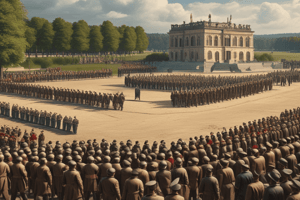Podcast
Questions and Answers
What was the Treaty of Versailles?
What was the Treaty of Versailles?
- A military alliance formed after World War II
- An economic treaty between Germany and France
- A peace agreement that ended World War I (correct)
- A document outlining the causes of World War II
What were some consequences of the Treaty of Versailles for Germany?
What were some consequences of the Treaty of Versailles for Germany?
- Limiting the size of their army (correct)
- Reducing taxes for Germany
- Granting Germany additional land
- Providing financial aid to Germany
Who was the leader of Germany before World War II?
Who was the leader of Germany before World War II?
- Winston Churchill
- Joseph Stalin
- Benito Mussolini
- Adolf Hitler (correct)
What ideology did the Nazi Party follow?
What ideology did the Nazi Party follow?
What was the philosophical basis of the Nazi Party's movement?
What was the philosophical basis of the Nazi Party's movement?
Which groups did the Nazi Party exclude as part of their vision for a 'perfect' race?
Which groups did the Nazi Party exclude as part of their vision for a 'perfect' race?
Who was the group most heavily targeted by the Nazis during World War 2?
Who was the group most heavily targeted by the Nazis during World War 2?
What event led to the US joining World War II in 1941?
What event led to the US joining World War II in 1941?
Which countries formed the Axis Powers in World War II?
Which countries formed the Axis Powers in World War II?
What was the main reason for Hitler's hostility towards Jewish people?
What was the main reason for Hitler's hostility towards Jewish people?
Which country did Japan attack in 1937, leading to years of conflict?
Which country did Japan attack in 1937, leading to years of conflict?
What caused Britain and France to declare war on Germany?
What caused Britain and France to declare war on Germany?
Who declared War on Japan after the attack on Pearl Harbor?
Who declared War on Japan after the attack on Pearl Harbor?
Which major cities in Japan were subjected to nuclear attacks during World War II?
Which major cities in Japan were subjected to nuclear attacks during World War II?
Which country formally surrendered to the United States, Great Britain, and the Soviet Union in 1945?
Which country formally surrendered to the United States, Great Britain, and the Soviet Union in 1945?
Which country did not declare war on Germany until 1941?
Which country did not declare war on Germany until 1941?
Flashcards are hidden until you start studying
Study Notes
Treaty of Versailles
- Signed in 1919, officially ended World War I.
- Imposed harsh reparations and territorial losses on Germany.
- Established the League of Nations to promote peace, but the US did not join.
Consequences for Germany
- Economic burden due to reparations led to hyperinflation and economic instability.
- Loss of territories reduced Germany's land and resources, diminishing its power.
- Stigmatized as the sole blame for World War I, fostering resentment among the German population.
Leader of Germany Before World War II
- Adolf Hitler ascended to power as Chancellor in 1933 and later Führer.
Ideology of the Nazi Party
- Followed a far-right, totalitarian ideology based on extreme nationalism and militarism.
- Promoted Aryan supremacy and anti-communism.
Philosophical Basis of the Nazi Movement
- Rooted in Social Darwinism, advocating the survival of the fittest and racial purity.
- Emphasized anti-Semitism as a cultural and political cornerstone.
Excluded Groups in Nazi Vision
- Excluded Jews, Romani people, disabled individuals, and non-Aryans from their ideal society.
- Promoted Aryan superiority as central to their racial ideology.
Targeted Group During World War II
- Jews were the most heavily targeted group, facing systemic extermination during the Holocaust.
- Approximately six million Jews were murdered, along with millions of others deemed undesirable.
Event Leading to US Joining WWII
- The attack on Pearl Harbor by Japan on December 7, 1941, prompted the US to enter the war.
Axis Powers in World War II
- Comprised Germany, Italy, and Japan.
- Formed a military alliance opposed to the Allied powers.
Hitler's Hostility Towards Jewish People
- Rooted in long-standing anti-Semitic beliefs, falsely blaming Jews for Germany's social and economic problems.
- Used Jews as a scapegoat to unify the nation under his regime.
Japan’s Conflict Initiation in 1937
- Attacked China, initiating a prolonged conflict known as the Second Sino-Japanese War.
Declaration of War by Britain and France
- Declared war on Germany following its invasion of Poland on September 1, 1939.
War Declaration on Japan
- The United States declared war on Japan following the Pearl Harbor attack on December 8, 1941.
Major Cities in Japan Affected by Nuclear Attacks
- Hiroshima and Nagasaki were the cities subjected to atomic bombings in August 1945.
Surrender in 1945
- Germany formally surrendered to the United States, Great Britain, and the Soviet Union on May 7, 1945.
Delayed War Declaration on Germany
- The Soviet Union did not declare war on Germany until June 22, 1941, following the invasion.
Studying That Suits You
Use AI to generate personalized quizzes and flashcards to suit your learning preferences.




